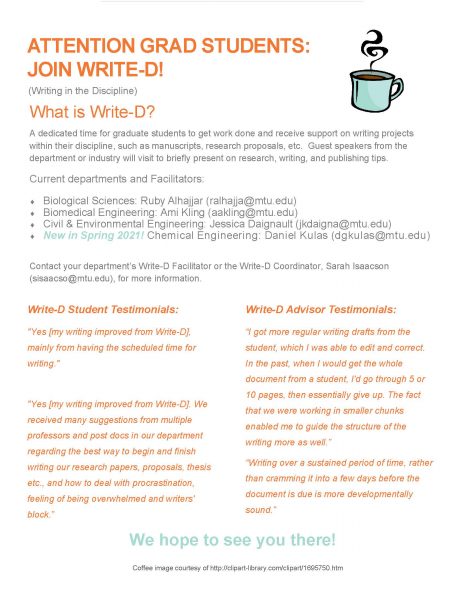The National Science Foundation’s Graduate Research Fellowship Program (GRFP) helps ensure the vitality of the human resource base of science and engineering in the United States and reinforces its diversity. The program recognizes and supports outstanding graduate students in NSF-supported science, technology, engineering, and mathematics disciplines who are pursuing research-based master’s and doctoral degrees at accredited US institutions.
Sponsored Program Enhancement will offer a seminar/workshop series to mentor students in developing competitive applications.
All sessions are from 12:00 to 12:50 and are located in the Pat Nelson Graduate Conference Center on the fourth floor of the Administration Building. Please contact Jodi Lehman (jglehman@mtu.edu) with any questions. Feel free to bring your lunch!
September 13th “Overview of Different Funding Opportunities and Resources for Domestic and International Students”
Dr. Jodi Lehman, Coordinator of Proposal and Fellowship Development, Sponsored Program Enhancement (SPE)
- Why apply
- Eligibility and Benefits of Diverse Funding Opportunities
- Resources for finding funding
- Resources for developing competitive application material
September 20th “Pulling Together Competitive NSF GRFP Application Material”
Dr. Jodi Lehman, Coordinator of Proposal and Fellowship Development, SPE
- Broader Impacts and Intellectual Merit
- The Personal Statement: A 5 point elevator speech
- Previous Research Experience: Thinking outside the traditional lab experience
- Proposed Plan of Research: A template for success
- Exceptional Letters of Recommendation
September 27th “Harness Your Brilliance: A Revision Process”
Mark Hopkins, NSF Fellow (awarded fellowship after second submission and tons of hard work) and PhD Candidate
Kara Sokol, Director of Integrated Marketing, University Marketing and Communication
- Why start early
- Who needs to be involved in the revision process
- Writing strategies and revision processes that worked
Tentative: October 4th “An Insider’s Perspective on the Review Process”
Dr. Debra Charlesworth, Assistant to the Dean of the Graduate School for Professional Development, Biomedical NSF GRFP Panel Chair
- Understand the review process
- High impact tips to make your reviewer happy J
October 11th “Broader Impacts…huh?”
NSF GRFP Reviewer and Tech Alumni, Dr. Caryn Heldt
- How to address broader impacts
- What activities and projects reflect clear interdisciplinary initiatives or implications, benefits to society, engagement with diverse groups, strong collaborations and partnerships, current and consistent outreach, ability to publish and present and future plans to do so.
October 18th or 25th “The Review Process”
Workshop: Gain a hands-on reviewer’s perspective and understand the importance of addressing the merit criteria – all in 45 minutes
TBA in early November “Mock Review”
Evening Workshop: Review applicant drafts while receiving feedback on your own drafts
